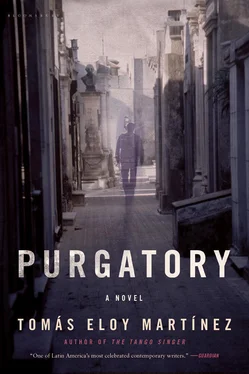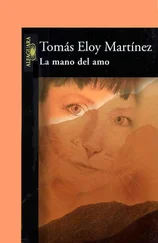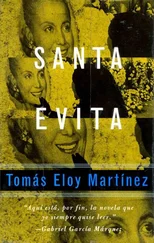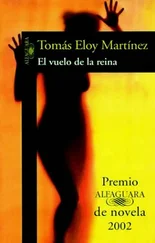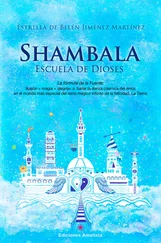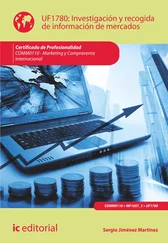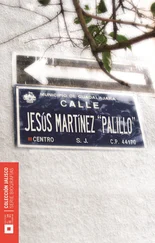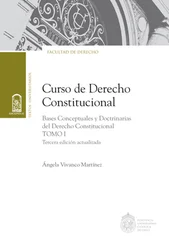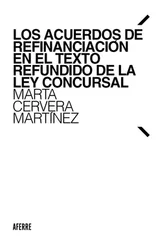Orson, he was told, travelled a lot and it was extremely rare to find him at his home in Beverly Hills. Sometimes he would take the overnight flight to Boston and, the next day, fly to some godforsaken town in Arizona. He was working tirelessly on the filming of Othello , adapting a short story by Isak Dinesen and writing a screenplay based on a novel by Graham Greene. One of the agents repeated to Dupuy Welles’s comments when he was informed about the project. A film about Argentina? Flamenco and bullfights? I’m intrigued. Tell this man to come and see me. I’ve had Capone and Lucky Luciano and Costello hounding me to make films for them — I dealt with them and I’m still alive.
Welles was waiting for him on the terrace at the back of the house, next to a vast swimming pool shaped like a kidney. It was December, a strong breeze was blowing, whipping up eddies of yellow leaves. As in Toledo, the director was chewing on a fat cigar. There was no smoke this time. He chewed it and spat the dark tobacco fibres onto the ground. He was still physically imposing, but more bloated now and the fat around his belly fell in folds over his trousers. A liveried servant brought two whisky glasses and poured generous measures, though Welles did not seem to notice. He was engrossed in reading Dupuy’s business card (his name, phone numbers and the logo of the newspaper), and every now and then he would glance through the papers and photographs piled on the table. Scripts, Dupuy supposed, and photographs of actors. He doesn’t need to prove he’s a busy man. I know he is. He realised Welles did not remember him. It is hardly surprising, we only met briefly one afternoon, he thought. It will come back to him when he hears my offer, an offer bigger than Hollywood, than Spain, an offer (Dupuy repeated to himself, excited now) as big as the world. He spoke to Welles in Spanish. The director replied in English.
‘May I call you Orson?’ Dupuy said. ‘We met about ten years ago, in Antonio Bienvenida’s dressing room.’
‘Call me Orsten,’ said Welles, giving no sign that he remembered Bienvenida. ‘That’s what Lucky Luciano called me, Orsten. I called him Charlie. Mind if I call you Charlie?’
‘If you like. Let me explain my project to you.’
Dupuy had to make several attempts. Welles knew nothing about football, had never heard of the World Cup, and his impression of Argentina was a vast horizon of pampas. He vaguely remembered Buenos Aires — he had been awarded a prize there for Citizen Kane in 1942. ‘I remember there was a fascist march protesting against my visit. Your country was sympathetic to fascism back then, wasn’t it, Charlie?’ The doctor said nothing, he did not want to get entangled in ideological explications. It was a potential quagmire. He, Dupuy, was a master of politics; Welles was barely a novice. On the other hand, it had been years since Dupuy had set foot in a cinema. ‘I won’t take up much of your time, Orsten. I’ve come to pitch a documentary with an unlimited budget, can you imagine? Obviously, the footage will be served to you on a plate, at least half the film would be taken up with the matches.’ This, he knew, was not true; Riefenstahl had had to painstakingly craft her film, but he did not want to discourage Welles. ‘It’s just a documentary, child’s play. We wouldn’t need much from you at all, Orsten, just your voice and your vision. And your name, Orson. When you’re done, you’ll have more than enough money to complete all the projects you left half finished. You’ll be able to go back to filming Don Quixote, King Lear, The Magic Mountain .’ ‘I’ve never been interested in The Magic Mountain ,’ Welles corrected him, ‘and the things in my past will stay in my past.’ ‘Allow me to explain our documentary to you a little better,’ Dupuy insisted, ‘it will only take two minutes. What my government wants is for you to make a great film, something that will go down in history, a Citizen Kane of documentary film-making. Just imagine the opening for a moment, Orson. The blue sky, dappled clouds, thousands of birds, the excited voices of the crowds we cannot see yet. And a microphone descending from above, just like in The Magnificent Ambersons ’ — his advisers had recommended that he not forget this point: the microphone, the stentorian voice, the commanding ego — ‘and then. and then, your voice as the screen opens up: “This is Orson Welles in Argentina. I wrote and directed this film.” What do you think?’
Welles stared at him, incredulous. ‘In the papers I have here it says that there are magicians in your country, Charlie, illusionists. is that true? As you know I am more of an illusionist than a director.’ Dupuy had been advised that Welles had recently released a film about forgery and magic, F for Fake . He had a copy in the screening room at La República , but had not had time to watch it. ‘You want to film magicians?’ Dupuy was surprised. ‘No problem,’ he said, ‘there are lots of them in Argentina. I’ll make sure you have everything you need.’ ‘Listen to me, Charlie, I read in here’ — Welles once again placed his huge hand on the files piled on the table — ‘the magicians in your government make people in the streets disappear.’ Dupuy began to panic. ‘Who told you that? They’re lies. Argentina has been the victim of a vicious smear campaign, a tissue of lies put about by subversive terrorists. Nobody is disappearing. There would be no need for you to address the matter in your film. We would prefer to show that ours is a peace-loving country and that our people are happy. We need to think positively, Orsten.’ He did not like this turn of the conversation, it was going off-track, and the longer it went on, the more difficult it would be to rectify. He needed to stop it before he or Welles lost their patience. He had been about to ask Welles to name his price. He restrained himself. The director was more astute and more refined than the intelligence services.
‘Maybe we can come to a deal, Charlie,’ said Welles. ‘As you probably know, many years ago I caused a panic in this country with a radio programme. I convinced two million people that Martians were invading New Jersey. People rushed out into the streets, crazed with terror. Art is illusion, Charlie, reality is illusion. Things exist only when we see them; in fact, you might say they are created by your senses. But what happens when this thing that doesn’t exist looks up and stares back at you? It ceases to be a something, it reveals its existence, rebels, it is a someone with density, with intensity. You cannot make that someone disappear because you might disappear too. Human beings are not illusions, Charlie. They are stories, memories, we are God’s imaginings just as God is our imagining. Erase a single point on that infinite line and you erase the whole line and we might all tumble into that black hole. Be careful, Charlie.’ Dupuy was confused, he couldn’t see what Welles was driving at. If he didn’t like the project, why didn’t he just say? There was no need to beat about the bush.
An icy wind whipped across the terrace. The director had a large black cloak and a scarf next to him, but he did not even look at them. He seemed impervious to the wind, to the gathering darkness, to the rusty December leaves that went on falling. He called for another whisky. ‘More than twenty years ago, I was asked to direct a documentary about Babe Ruth,’ he said. ‘You know who Babe Ruth was? A baseball legend the like of which has never been seen since. I didn’t like baseball, I’d never seen Babe in his glory days, but people worshipped him and I was interested in recording that idolisation on film. I took on the project and went to work. We shot a few scenes with him. He was a very sick man by then, throat cancer, so obviously he couldn’t talk much. I convinced the producers that we would invent Babe, that we would create a life for him. I wanted to show him shaking Roosevelt’s hand, touching Marlene Dietrich’s legs, playing dice with Gary Cooper. In cinema, you can create any reality you want, imagine things that don’t yet exist, freeze some moment in the past and move to a point in the future; the football matches can be reflected in anything, Charlie, they’re just smoke and air, the stadiums can be filled with crowds using special effects. Maybe we can come to some arrangement. Let’s make this documentary of yours, but there is no World Cup, there are no players, no football matches. There’s only magic. You stop seeing, you stop talking and everything disappears. It would be a great metaphor for your country.
Читать дальше
